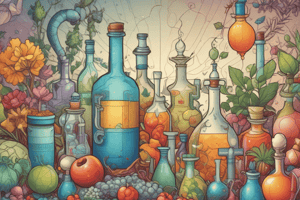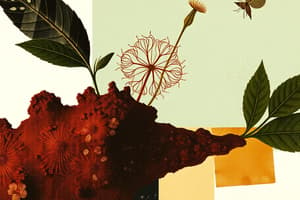Podcast
Questions and Answers
Which plant is the source of morphine?
Which plant is the source of morphine?
- Opium poppy (correct)
- Digitalis purpurea
- Foxglove
- Madagascar periwinkle
What is the source of heparin?
What is the source of heparin?
- Pig pancreas
- Pig intestines (correct)
- Bacteria
- Cow liver
Which of the following is an example of a synthetic source of a drug?
Which of the following is an example of a synthetic source of a drug?
- Aspirin (correct)
- Penicillium mold
- Madagascar periwinkle
- Opium poppy
What is the source of semi-synthetic opioids like hydrocodone and oxycodone?
What is the source of semi-synthetic opioids like hydrocodone and oxycodone?
Which of the following is an example of a recombinant source of a drug?
Which of the following is an example of a recombinant source of a drug?
What is the source of antibiotics like erythromycin?
What is the source of antibiotics like erythromycin?
Which of the following is an example of a marine source of a drug?
Which of the following is an example of a marine source of a drug?
What is the source of digoxin?
What is the source of digoxin?
Which of the following is an example of a synthetic antibiotic?
Which of the following is an example of a synthetic antibiotic?
What is the source of vinblastine?
What is the source of vinblastine?
Flashcards are hidden until you start studying
Study Notes
Natural Sources
- Plants: Many drugs are derived from plants, such as:
- Morphine from opium poppy (Papaver somniferum)
- Digoxin from foxglove (Digitalis purpurea)
- Vinblastine from Madagascar periwinkle (Catharanthus roseus)
- Animals: Some drugs come from animals, including:
- Heparin from pig intestines
- Insulin from pig or cow pancreas (although most is now produced recombinantly)
- Microorganisms: Microbes are a source of various drugs, such as:
- Antibiotics like penicillin from Penicillium mold
- Tetracycline from Streptomyces bacteria
Synthetic Sources
- Chemical Synthesis: Many drugs are created entirely in a laboratory through chemical reactions, such as:
- Aspirin
- Ibuprofen
- Antidepressants like fluoxetine (Prozac)
- Semi-Synthetic Sources: Some drugs are derived from natural sources but undergo significant chemical modification, including:
- Semi-synthetic opioids like hydrocodone and oxycodone from opium
- Semi-synthetic antibiotics like ampicillin from penicillin
Recombinant Sources
- Genetic Engineering: Recombinant DNA technology allows for the production of drugs through genetically modified organisms, such as:
- Insulin from bacteria
- Human growth hormone from bacteria
- Vaccines like HPV and Hepatitis B from yeast or bacteria
Other Sources
- Marine Sources: Some drugs are derived from marine organisms, including:
- Anti-cancer drugs like trabectedin from sea squirts
- Pain relievers like ziconotide from cone snails
- Fermentation: Fermentation processes can be used to produce drugs, such as:
- Antibiotics like erythromycin from bacteria
- Statins for cholesterol reduction from fungi
Natural Sources
- Plants are a source of many drugs, including morphine from opium poppy, digoxin from foxglove, and vinblastine from Madagascar periwinkle.
- Animals provide some drugs, such as heparin from pig intestines and insulin from pig or cow pancreas (although most insulin is now produced recombinantly).
- Microorganisms like Penicillium mold and Streptomyces bacteria are used to produce antibiotics like penicillin and tetracycline.
Synthetic Sources
- Chemical synthesis in a laboratory is used to create drugs like aspirin, ibuprofen, and fluoxetine (Prozac).
- Semi-synthetic sources involve deriving drugs from natural sources but with significant chemical modification, resulting in drugs like hydrocodone and oxycodone from opium, and ampicillin from penicillin.
Recombinant Sources
- Genetic engineering enables the production of drugs through genetically modified organisms, such as insulin from bacteria, human growth hormone from bacteria, and vaccines like HPV and Hepatitis B from yeast or bacteria.
Other Sources
- Marine organisms are a source of some drugs, including anti-cancer drugs like trabectedin from sea squirts, and pain relievers like ziconotide from cone snails.
- Fermentation processes are used to produce drugs like antibiotics like erythromycin from bacteria, and statins for cholesterol reduction from fungi.
Studying That Suits You
Use AI to generate personalized quizzes and flashcards to suit your learning preferences.




